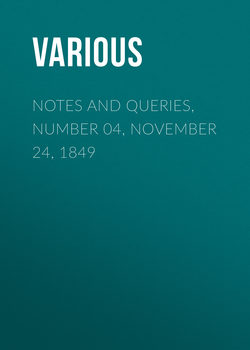Читать книгу Notes and Queries, Number 04, November 24, 1849 - Various - Страница 4
NOTES
ADVERSARIA
Оглавление[In our Prospectus we spoke of NOTES AND QUERIES becoming everybody's common-place book. The following very friendly letter from an unknown correspondent, G.J.K., urges us to carry out such an arrangement.
"Sir,—I beg leave to forward you a contribution for your 'NOTES AND QUERIES,' a periodical which is, I conceive, likely to do a vast deal of good by bringing literary men of all shades of opinion into closer juxtaposition than they have hitherto been.
"I would, however, suggest that in future numbers a space might be allotted for the reception of those articles (short of course), which students and literary men in general, transfer to their common-place books; such as notices of scarce or curious books, biographical or historical curiosities, remarks on ancient or obsolete customs, &c. &c. &c. Literary men are constantly meeting with such in the course of their reading, and how much better would it be if, instead of transferring them to a MS. book to be seen only by themselves, or perhaps a friend or two, they would forward them to a periodical, in which they might be enshrined in imperishable pica; to say nothing of the benefits such a course of proceeding would confer on those who might not have had the same facilities of gaining the information thus made public.
"In pursuance of this suggestion, I have forwarded the inclosed paper, and should be happy, from time to time, to contribute such gleanings from old authors, &c. as I might think worth preserving.
"G.J.K."
We readily comply with G.J.K.'s suggestion, and print, as the first of the series, his interesting communication, entitled:]
1. Writers of Notes on Fly-leaves, &c.
The Barberini Library at Rome contains a vast number of books covered with marginal notes by celebrated writers, such as Scaliger, Allatius, Holstentius, David Haeschel, Barbadori, and above all, Tasso, who has annotated with his own hand more than fifty volumes. Valery, in his Voyages en Italie, states that a Latin version of Plato is not only annotated by the hand of Tasso, but also by his father, Bernardo; a fact which sufficiently proves how deeply the language and philosophy of the Greek writers were studied in the family. The remarks upon the Divina Commedia, which, despite the opinion of Serassi, appear to be authentic, attest the profound study which, from his youth, Tasso had made of the great poets, and the lively admiration he displayed for their works. There is also in existence a copy of the Venice edition of the Divina Commedia (1477), with autograph notes by Bembo.
Christina of Sweden had quite a mania for writing in her books. In the library of the Roman College (at Rome) there are several books annotated by her, amongst others a Quintus Curtius, in which, as it would appear, she criticises very freely the conduct of Alexander. "He reasons falsely in this case," she writes on one page; and elsewhere, "I should have acted diametrically opposite; I should have pardoned;" and again, further on, "I should have exercised clemency;" an assertion, however, we may be permitted to doubt, when we consider what sort of clemency was exercised towards Monaldeschi. Upon the fly-leaf of a Seneca (Elzevir), she has written, "Adversus virtutem possunt calamitates damna et injuriæ quod adversus solem nebulæ possunt." The library of the Convent of the Holy Cross of Jerusalem at Rome, possesses a copy of the Bibliotheca Hispanu, in the first volume of which the same princess has written on the subject of a book relating to her conversion:* "Chi l'ha scritta, non lo sa; chi lo sa, non l'ha mai scritta."
Lemontey has published some very curious Memoirs, which had been entirely written on the fly-leaves and margins of a missal by J. de Coligny, who died in 1686.
Racine, the French tragic poet, was also a great annotator of his books; the Bibliothèque National at Paris possesses a Euripides and Aristophanes from his library, the margins of which are covered with notes in Greek, Latin, and French.
The books which formerly belonged to La Monnoie are now recognizable by the anagram of his name. A Delio nomen, and also by some very curious notes on the fly-leaves and margins written in microscopic characters.
G.J.K.
1
Conversion de la Reina de Suecia in Roma (1656).
